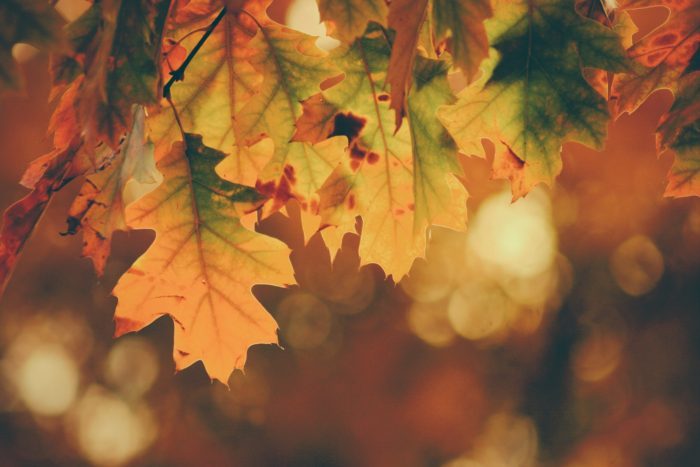(单词翻译:单击)
As the days shorten and temperatures drop in the northern hemisphere, leaves begin to turn. We can enjoy glorious autumnal colours while the leaves are still on the trees and, later, kicking through a red, brown and gold carpet when out walking.
随着北半球白昼缩短、气温下降,叶子开始变黄。当叶子还在树上时,我们能观赏到秋日的绚丽色彩,在外出散步时,还能踩着红色、棕色和金色的“地毯”。
When temperatures rise again in spring, the growing season for trees resumes. Throughout the warmer months, trees take carbon dioxide from the atmosphere and store it in complex molecules, releasing oxygen as a byproduct. This, in a nutshell, is the process of photosynthesis. The more photosynthesis, the more carbon is locked away.
当春天来临,气温回升,树木重新焕发生机。在温暖的月份,树木从大气中吸收二氧化碳并将其储存在复杂分子中,氧气作为副产物随之被释放出来。简而言之,这个过程就是光合作用。光合作用越多,被锁住的碳就越多。
We know that carbon dioxide is a major driver of climate change, so the more that can be taken out of the atmosphere by plants, the better. With the warmer climate leading to a longer growing season, some researchers have suggested that more carbon dioxide would be absorbed by trees and other plants than in previous times. But a new study has turned this theory on its head and could have profound effects on how we adapt to climate change.
我们知道二氧化碳是造成气候变化的主要因素,所以植物从大气中吸收的二氧化碳越多越好。随着气候变暖导致植物生长季延长,一些研究人员认为,树木和其他植物吸收的二氧化碳将比以前多。但是一项新研究颠覆了这一理论,并可能对人类如何适应气候变化产生深远影响。
The researchers, led by Deborah Zani at the Swiss Federal Institute of Technology, studied the degree to which the timing of colour changes in autumn tree leaves was determined by the growth of the plant in the preceding spring and summer.
由瑞士联邦理工学院的黛博拉·扎尼领导的团队研究了秋天树叶变色的时间受春夏生长情况影响的程度。
Temperature and day length were traditionally accepted as the main determinants of when leaves changed colour and fell, leading some scientists to assume that warming temperatures would delay this process until later in the season. Studying deciduous European tree species, including horse chestnut, silver birch and English oak, the authors of the new study recorded how much carbon each tree absorbed per season and how that ultimately affected when the leaves fell.
传统上,气温和白昼长度是决定叶子何时变色和掉落的主要因素,这导致一些科学家认为气候变暖会推迟这一过程。新研究的作者们考察了七叶树、银桦树和英国橡树等欧洲落叶树种,记录了每棵树每季吸收的碳量及其最终对落叶时间的影响。
Using data from the Pan European Phenology Project, which has tracked some trees for as long as 65 years, the researchers found in their long-term observational study that as the rate of photosynthesis increased, leaves changed colour and fell earlier in the year. For every 10% increase in photosynthetic activity over the spring and summer growing season, trees shed their leaves, on average, eight days earlier.
研究人员利用泛欧洲物候学项目的数据,经过长期观察发现,随着光合作用速率的提高,树叶变色和掉落的时间都提前了。泛欧洲物候学项目对一些树木进行了长达65年的追踪记录。研究发现,在春夏生长季节中的光合作用活动每增加10%,树叶掉落的平均时间就会提早8天。

Climate-controlled experiments on five-year-old European beech and Japanese meadowsweet trees suggest what could be behind this unexpected result. In these trials, the trees were exposed to full sun, half shade or full shade. The results show that there is a limit to the amount of photosynthesis that a tree can carry out over a growing season. Think of it like filling a bucket with water. It can be done slowly or quickly, but once the bucket is full, there is nowhere for any more water to go.
对五岁的欧洲山毛榉和日本绣线菊的气候控制试验揭示了这一意外结果背后的原因。在这些试验中,树木分别被暴露在充足的日光中、半阴以及全阴环境中。结果显示,一棵树在生长季中能发生的光合作用总量是有限的。你可以将其想象成用水桶打水。你可以慢慢地将水桶装满水,也可以快速地装满,可是一旦水桶满了,就再也装不进水了。
This research shows that deciduous trees can only absorb a set amount of carbon each year and once that limit is reached, no more can be absorbed. At that point, leaves begin to change colour. This limit is set by the availability of nutrients, particularly nitrogen, and the physical structure of the plant itself. Nitrogen is a key nutrient which plants need in order to grow, and it's often the amount of available nitrogen that limits total growth. This is why farmers and gardeners use nitrogen fertilisers, to overcome this limitation.
研究表明,落叶乔木每年只能吸收一定量的碳,一旦达到极限,便无法吸收更多的碳。从那时起,树叶就开始变色。这一极限是由树木可获得的养分(尤其是氮)以及树木本身的物理结构所决定的。氮是植物生长所需的关键营养素,而氮的获得量往往会限制植物的总生长量。这就是农民和园丁使用氮肥来克服这一限制的原因。
Together, these constraints mean that carbon uptake during the growing season is a self-regulating mechanism in trees and herbaceous plants. Only so much carbon can be taken up.
总之,这些限制意味着在生长季吸收碳是树木和草本植物的一种自我调节机制。植物所能吸收的碳是有极限的。
In a world with increasing levels of carbon in the atmosphere, these new findings imply that warmer weather and longer growing seasons will not allow temperate deciduous trees to take up more carbon dioxide. The study's predictive model suggests that by 2100, when tree growing seasons are expected to be between 22 and 34 days longer, leaves will fall from trees between three and six days earlier than they do now.
在大气中的二氧化碳水平不断上升的今天,这些新研究发现意味着气候变暖和生长季延长不会让落叶乔木吸收更多的二氧化碳。该研究的预测模型表明,到2100年,预计树木生长季将延长22至34天,树叶掉落的时间比现在要提早3至6天。
This has significant implications for climate change modelling. If we accept that the amount of carbon taken up by deciduous trees will remain the same each year regardless of the growing season, carbon dioxide levels will rise more quickly than was previously expected. The only way to change this will be to increase the capacity of trees to absorb carbon.
这对气候变化建模具有重要意义。如果我们认同无论生长季长短,落叶乔木每年吸收的碳总量不变,那么二氧化碳水平的上升速度将比原先预期的更快。改变这一局面的唯一方法就是提高树木吸收碳的能力。
Plants that aren't limited by the amount of nitrogen available may be able to grow for longer in the warming climate. These are the trees which can take nitrogen from the air, such as alder. But these species will still lose their leaves at roughly the same time as always, thanks to less daylight and colder temperatures.
在气候变暖的情况下,不受氮肥限制的植物生长时间可能会更长。这种树可以从空气中获取氮,比如桤木。但是入秋后由于白昼缩短、气温降低,这些树仍然会在和往年差不多的时间落叶。
But on the upside, with the prospect of some trees losing their leaves earlier and others losing them at the time they do now, there might be the prospect of prolonged autumnal colours—and more time for us to kick through the leaves.
从好的方面来看,由于一些树提早落叶,而另外一些树和现在落叶时间一致,我们未来看到秋叶美景的时间可能会延长,这意味着我们将有更多时间可以踩着落叶走路。


